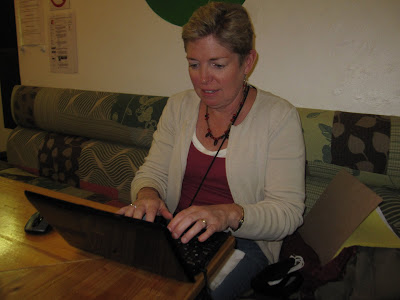Yesterday I began work with Jawaya and Robert Shea. They introduced me to many staff members, grad students, researchers, at the Child and Public Health Compound. They explained the big picture of their project - including their summer camp experiences for children who are chronically ill or have life threatening illnesses, additional experiences there for the kids' parents, and the counselors who work with the campers and will be their mentors. We decided to begin by focusing our training curriculum on the moms (hopefully a grandmother and a couple of dads will join the group as well) who we have immediate access to and will offer a relaxing camp experience to them while they receive the training. Then we can test it out right away, adapt if needed, and expand into counselor training to support all of this next. We began looking at my teaching materials, their stories of previous camp experiences with the kids, and cultural factors that will guide our interactions. A funny story about the camp first opening - at dinner time they offered food to the children first - not a culturally appropriate thing to do among Xhosa families, and the kids gorged themselves until sick while the parents responded with anger. Homework for us last night was to interview people we know living in local townships - as many cultural groups as we could connect with - and ask questions about discipline, interaction with grandparents, common toys and games, the value of education, and more. Today Jawaya and Robert took me to the Red Cross Children's Hospital. I will post photos soon, as I did receive permission to take photographs as long as I kept the children's faces out of the shots, so you'll see the backs of the children on purpose. This was a humbling experience. We take good health and quick, efficient health care for granted at home! Jawaya took me on rounds in the infant's ward. The babies looked so frail, and miserable with oxygen tubes and IVs connected. The best comfort they had was if the mom, and in a couple of cases, the dad, were there simply to hold them. I commented on the fraility of the babies, and Jawaya responded, "These are the healthy ones! They're still alive!" Then on to play with the preschoolers in the clinic waiting room. Their monthy check ups included having blood drawn. I was so impressed with the self-regulation ability of a 2 year old girl who was showing me a coloring book when another child who had just left the waiting room began to cry loudly. She looked worried, then began to suck her thumb, then ran to her mom for comfort saying the Xhosa word for blood, then calmed down and came back to the coloring book. She knew very well that her turn to have blood drawn was next. The hospital seemed a very child friendly place all in all, with smiling staff and painted murals everywhere. The moms who met me in the waiting room and learned the purpose of my visit offered to come to the training. Jawaya promised to come to their homes to give them information and have them sign the participation forms. Then back to the drawing board for curriculum training. It looks like our training goals will include empowering parents, guidance practice, activities to enhance parent-child interactions that will support physical, cognitive, social, and emotional development. Tomorrow we'll design games and activities that parents can make or do with their children at home with materials at hand. Compared to the things we think we have to have at home, this will be very simple. No computer games, writing materials, board games, or educational toys: this will include old tires, balls, empty water bottles, rocks, sticks, and seashells. Another thing that happened today - we stopped at the store and bought 60 rand (about $8) worth of bananas and carrots. We gave them to children and adults at the hospital, as many of the families bringing kids to the clinic can afford to eat about every third day. Happy banana faces!
















